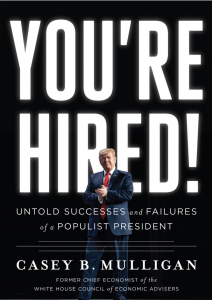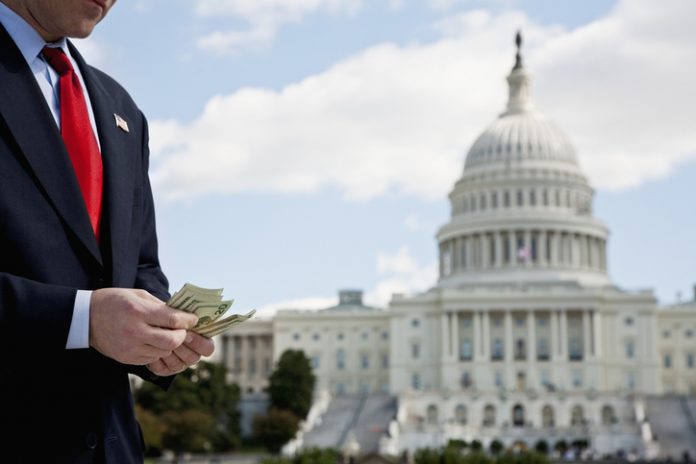Review of You’re Hired: Untold success and Failures of a Populist President, Republic Book Publishers, by Casey B. Mulligan, 237 pages, $25.95

Populism is a reaction to flawed governing by a small, unelected, and insulated ruling class … Lacking vigorous competition, the ruling class has little incentive to find its mistakes, or to acknowledge others who find them. Challenging fellow members of the ruling class carries personal risks and takes energy that could be directed in other ways.
Casey Mulligan wrote these words a few months before the November 2020 election brought the ruling class back to power in Washington — with a vengeance. In many respects, of course, it was never really out of power.
Throughout the Trump administration, the ruling class held the commanding heights throughout the federal bureaucracy, academia, the media, Wall Street, and the corporate world, especially Big Tech. But for four years, the nation’s elites were forced to do battle with people who, if not necessarily from the wrong side of the tracks, represented a segment of the population the ruling class would just as soon ignore.
A professor of economics at the University of Chicago, Mulligan served the Trump administration as chief economist at the White House Council of Economic Advisors (CEA) from September 2018 to August 2019. Together with his CEA colleagues and other kindred spirits in the administration, Mulligan set out to undo many of the policies imposed by the administrative regulatory state and Congress in recent decades.
While CEA’s purview is broad, Mulligan and his colleagues found themselves spending plenty of time trying to streamline America’s hopelessly complicated health care system. Their goal was to bring choices to consumers that were (and still are) being denied them through the Affordable Care Act (ACA), Medicare, Medicaid, and other practices relating to prescription drug prices.
What the Trump administration undertook administratively was supposed to be flanked by congressional Republicans keeping their pledge to repeal and replace Obamacare. When the latter misfired (save for the repeal of the ACA’s Individual Mandate in the 2017 tax-reform bill), and the GOP lost the House in the 2018 midterm elections, the White House was limited to making regulatory proposals.
Mulligan is unsparing in his criticism of how congressional Republicans handled the ACA when they had the majority to do something about it. “By refusing to put forward a real Republican plan, Senate Majority Leader Mitch McConnell was unwittingly setting up the 9-year-old Obamacare as the alternative to Medicare for All,” writes Mulligan. “Why should Americans be limited to two lousy choices?”
Washington and the Opioid Epidemic
The outbreak of the COVID-19 pandemic in early 2020 has largely obscured another health care challenge that Mulligan believes the ruling class had little interest in pursuing: the opioid crisis. “The ruling class does not understand the costs of forcing people to buy health insurance,” writes Mulligan. “It struggles to remember that more people may see reversing the opioid epidemic as more urgent than reversing climate change.” Mulligan might have added a disproportionate number of opioid deaths occur in places like West Virginia and Kentucky, venues not frequented by the ruling class.
Indeed, Washington’s policies played no small role in the opioid epidemic, which has seen over 400,000 Americans die of opioid overdoses since 2000. As he explains:
The 2006 Medicare expansion known as Medicare Part D made opioid addiction more affordable. The 2010 Affordable Care Act (Section 2502) further expanded that coverage to prescription tranquilizers with deadly (and unlabeled) opioid interactions. Insurance coverage might save lives in other ways, but the point here is how Washington’s calculous perennially ignored the opioid epidemic.
“Corporate Welfare”
Not all the problems with which Mulligan had to contend could be put at the feet of Congress or a previous administration. Some were homemade. A prime example was Health and Human Services Secretary Alex Azar’s “rebate rule.” Azar, who does not emerge from Mulligan’s pages unblemished, proposed a rule in 2018 that would not allow pharmaceutical companies to send rebate checks to Medicare drug plans. According to Mulligan, Azar’s scheme would have increased the profits of drug companies and increased the price of Medicare premiums paid by senior citizens and taxpayers.
When Azar dispatched members of his staff to a CEA meeting to pitch the plan, they proudly pointed out that the president of Pfizer thought it was an “excellent idea. “
“The culture of regulation is so ingrained at the Health Department (HHS),” Mulligan notes, “that it did not occur to them that in a room full of White House staff enthusiastic to ‘drain the swamp,’ drug company approval of a regulation helping protect it from competition would be seen as convincing evidence that the regulation contradicts administration policies.”
After 29,905 public comments had been submitted on the rebate rule, a follow-up CEA meeting was held on April 3, 2019, at which Trump, Azar, and Vice President Pence were in attendance. Defending the rule, Azar unveiled a convoluted “risk corridor” scheme that would somehow deal with the problem of rising premiums. Unimpressed, Pence said, “It looks like this rule is corporate welfare for both drug companies and insurance companies.” Three months later, Trump killed the rule.
Mulligan’s tenure at the White House predated the outbreak of COVID-19, and his book went to press before Biden was declared the winner of the 2020 election. The Donald Trump the reader encounters in these pages, though occasionally profane, is engaged and inquisitive and bears little resemblance to the stereotypical depiction common to mainstream media outlets.
Bonner R. Cohen, Ph.D., (bcohen@nationalcenter.org) is a senior fellow at the National Center for Public Policy Research.




















